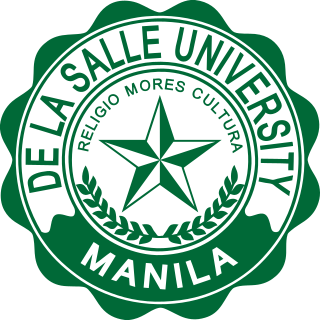
De La Salle University, also referred to as DLSU, De La Salle or La Salle, is a private, Catholic coeducational research university run by the Institute of the Brothers of the Christian Schools with main campus in Taft Avenue, Malate, Manila, Philippines. It was established by the Christian Brothers in 1911 as De La Salle College (DLSC) in Nozaleda Street, Paco, Manila with Blimond Pierre Eilenbecker, FSC serving as director, and is the first De La Salle school in the Philippines. The college was granted university status on February 19, 1975, and is the oldest constituent of De La Salle Philippines (DLSP), a network of 16 educational institutions, established in 2006 replacing the De La Salle University System.
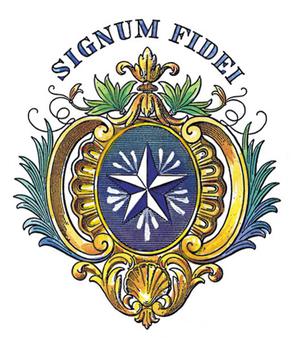
The De La Salle Brothers, officially named the Institute of the Brothers of the Christian Schools abbreviated FSC, is a Catholic lay religious congregation of pontifical right for men founded in France by Jean-Baptiste de La Salle (1651–1719), and now based in Rome, Italy. The De La Salle Brothers are also known as the Christian Brothers, French Christian Brothers, or Lasallian Brothers. The Lasallian Christian Brothers are distinct from the Congregation of Christian Brothers, often also referred to as simply the Christian Brothers, or Irish Christian Brothers. The Lasallian Brothers use the post-nominal abbreviation FSC to denote their membership of the order, and the honorific title Brother, abbreviated "Br."
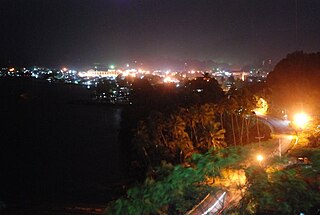
Bislig, officially the City of Bislig, is a 3rd class component city in the province of Surigao del Sur, Philippines. According to the 2020 census, it has a population of 99,290 people.

De La Salle Lipa, also known by its acronym DLSL, is a private Catholic Lasallian basic and higher educational institution run by the De La Salle Brothers of the Philippine District of the Christian Brothers in Lipa City, Batangas, Philippines and was founded in 1962. It is one of the third generation of La Salle schools founded by the Catholic religious congregation De La Salle Brothers in the Philippines: La Salle Academy-Iligan in 1958, La Salle Green Hills (Mandaluyong) in 1959, Saint Joseph School-La Salle in 1960 and De La Salle Lipa in 1962.

The De La Salle Santiago Zobel School, also referred to by its acronym DLSZ or De La Salle Zobel, is a private Catholic basic education institution for boys and girls run by the Philippine District of the De La Salle Brothers in Muntinlupa, Metro Manila, Philippines. It was opened in 1978 by the De La Salle Brothers because of the increasing number of students in the grade school department of the former De La Salle College in Manila.

De La Salle College "Oaklands" is an independent, co-educational, Catholic college preparatory institution run by the Institute of the Brothers of the Christian Schools in Toronto, Ontario. Founded by the Christian Brothers in 1851, it offers a rigorous liberal arts education from grades 5 through 12, consistent with its Lasallian traditions and values.

De La Salle Philippines (DLSP), established in 2006, is a network of Lasallian educational institutions within the Lasallian East Asia District established to facilitate collaboration in the Lasallian Mission and the promotion of the Spirit Of Faith, Zeal For Service and Communion In Mission. There are currently sixteen Lasallian Educational Institutions in the Philippines. De La Salle Philippines replaced the De La Salle University System which was established under the presidency of Br. Andrew Gonzalez FSC in 1987 as a response to the rapid expansion of Lasallian educational institutions nationwide. De La Salle Philippines is a member of a network of over 1,100 Lasallian educational institutions in 80 countries.
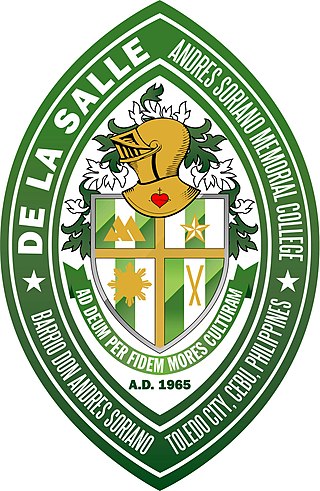
The De La Salle Andrés Soriano Memorial College, also known by its acronym DLSASMC, is a private Catholic Lasallian basic and higher education institution run by the De La Salle Brothers of the Philippine District of the Christian Brothers in Lutopan, Toledo, Cebu, Philippines. It was opened in 1965. The college campus occupies 6.9 hectares. The institution is named in memory of Andrés Soriano, Sr., a prominent Filipino businessman.
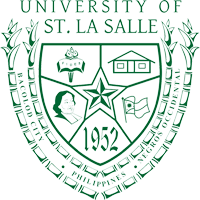
The University of St. La Salle (USLS) is a Catholic private research university run by the De La Salle Brothers, located in La Salle Avenue, Bacolod, Negros Occidental, Philippines. Established in 1952 as La Salle College - Bacolod, it is the second oldest campus founded by the congregation in the country. The university is a member of De La Salle Philippines, a network established in 2006 comprising 16 Lasallian educational institutions in the Philippine islands. The university offers preschool, elementary, secondary, undergraduate, and graduate programs. It has seven colleges namely: Business and Accountancy, Engineering and Technology, Arts and Sciences, Education, Nursing, Law, and Medicine.
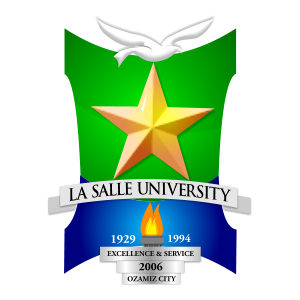
La Salle University – Ozamiz is a private Catholic Lasallian coeducational basic and higher education institution run by the Philippine District of the Christian Brothers in Ozamiz City, Misamis Occidental Philippines. It is a member of De La Salle Philippines, a network of Lasallian educational institutions within the Lasallian East Asia District.
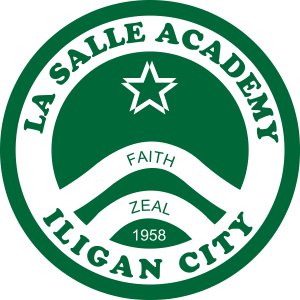
La Salle Academy is a private Catholic La Sallian basic education institution run by the Philippine District of the Institute of the Brothers of the Christian Schools in Iligan City, Lanao del Norte, Philippines. It was founded in 1958. It is the first of the third generation of La Salle schools founded by the De La Salle Brothers in the country, namely: La Salle Green Hills in Mandaluyong (1959), Saint Joseph School-La Salle in Bacolod (1960), and De La Salle Lipa in Lipa City (1962).
Brother Albinus Peter Graves, F.S.C., was an American Lasallian Brother who was last posted to the De La Salle Brothers in the Philippines and was a President of De La Salle College in Manila.

Brother Lucian Athanasius Reinhart, F.S.C. was an American De La Salle Brother who was last assigned to the De La Salle Brothers in the Philippines and was a President of De La Salle College in Manila.
Immaculata-La Salle High School is a private, Roman Catholic high school in the Coconut Grove neighborhood of Miami, Florida. It is part of the Roman Catholic Archdiocese of Miami and located between Mercy Hospital and Vizcaya on South Bayshore Drive.

College of St. John–Roxas, also known simply as St. John, is a private college run under the supervision of the De La Salle Brothers, and now a member of the Association of Lasallian Affiliated Schools (ALAS) under the De La Salle Philippines located in Roxas City, Philippines. It has been known as University of St. La Salle – Affiliate College and La Salle Affiliate College. In June 2000, the school managed the high school department of Our Lady of Mount Carmel Learning Center.

The De La Salle Supervised Schools is a network of Lasallian private schools in the Philippines under the wing of the Lasallian Schools Supervision Services Association, Inc. (LASSSAI) through its mission arm, the Lasallian Schools Supervision Office (LASSO).
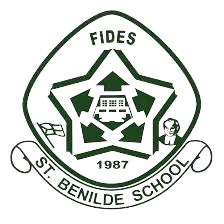
St. Benilde School, officially St. Benilde School, Inc. or colloquially known simply as Benilde, is a Private Catholic High school and Elementary school in Lasalleville, Mansilingan, Bacolod, Philippines. It is one of the Lasallian educational institutions in the country. Benilde underwent through the supervision of University of St. La Salle and the De La Salle Brothers, and is now a member of Association of Lasallian Affiliated Schools (ALAS), a network of Lasallian private schools. The school serves the community of students from neighboring subdivisions such as Lasalleville, St. Benilde Homes, Grandville, Hillside, Forest Hills, and Regent Pearl. It was founded as a La Salle School by Br. Rolando Dizon FSC, a past President of De La Salle University, Manila, in 1987.
Andrés Soriano Sr. was a Spanish Filipino industrialist. Described by The New York Times in 1964 as "one of the most dominant business personalities in the western Pacific area," he was best known for expanding the original San Miguel Brewery evolving into San Miguel Corporation.




















